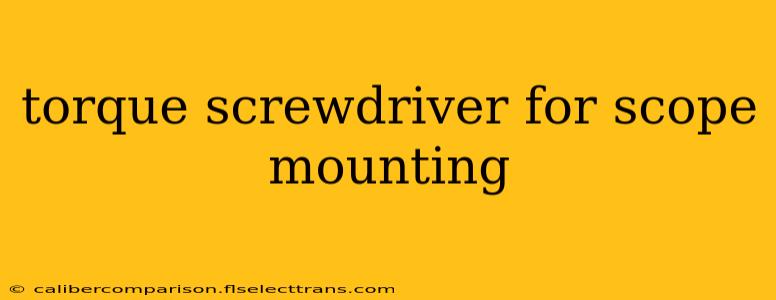Mounting a riflescope accurately is crucial for consistent shot placement. A poorly mounted scope can lead to frustrating misses and even damage to your firearm. This is where a torque screwdriver becomes invaluable. This isn't just about tightening screws; it's about achieving the perfect clamping force to ensure both optimal performance and the longevity of your equipment. This guide will delve into the importance of torque screwdrivers for scope mounting, helping you understand why precision is paramount and how to choose the right tool for the job.
Why Use a Torque Screwdriver for Scope Mounting?
Using a standard screwdriver for scope mounting carries significant risks. Over-tightening can strip screws, damage the scope's mounting rings, or even crack the scope tube itself. Under-tightening, conversely, leads to an unstable mounting platform, resulting in scope shift and inaccurate shot groups. This is where the precision of a torque screwdriver comes into play.
Here's why a torque screwdriver is essential:
- Prevents Damage: It ensures you apply the exact amount of force recommended by the scope and mount manufacturer, minimizing the risk of damage to your valuable equipment.
- Consistent Results: By maintaining consistent torque, you guarantee a repeatable, reliable mounting process every time, leading to better accuracy and reduced zeroing time.
- Safe Mounting: Eliminates the guesswork and risk of human error, providing a secure and safe mounting process.
- Extended Equipment Life: Proper torque application protects your investment by extending the lifespan of your scope and mounting hardware.
Understanding Torque Specifications
Every scope and mounting system will have specific torque specifications. These are usually expressed in inch-pounds (in-lb) or Newton-meters (Nm). Always consult the manufacturer's instructions to determine the appropriate torque setting for your specific setup. Failing to do so can void warranties and potentially damage your equipment. This information is typically found in the product documentation or on the manufacturer's website.
Choosing the Right Torque Screwdriver
Not all torque screwdrivers are created equal. When selecting one for scope mounting, consider these factors:
- Range: Ensure the screwdriver's torque range encompasses the specifications of your scope and rings.
- Accuracy: Look for a screwdriver with high accuracy and a clear, easy-to-read torque setting display. Digital torque screwdrivers are often preferred for their precision.
- Drive Size: Choose a screwdriver with the appropriate drive size (e.g., Phillips or flathead) to match your scope mounting screws.
- Calibration: Consider a screwdriver that is easily calibrated or comes with a calibration certificate to ensure ongoing accuracy.
Types of Torque Screwdrivers
There are several types of torque screwdrivers available, each with its own advantages and disadvantages:
- Click-type: These screwdrivers emit an audible "click" when the desired torque is reached.
- Digital: These screwdrivers provide a digital readout of the applied torque, offering greater precision and easier monitoring. They often have features such as preset torque settings and data logging.
- Beam-type: These are simpler, often analog devices, providing visual indication of applied torque. While less precise than digital models, they can be sufficient for some applications.
Beyond the Tool: Best Practices for Scope Mounting
Even with the best torque screwdriver, proper scope mounting requires attention to detail.
- Cleanliness: Ensure all surfaces are clean and free of debris before mounting.
- Lubrication: A small amount of anti-seize compound on the threads can aid in preventing corrosion and ensure smooth tightening.
- Base Alignment: Double-check that your scope bases are correctly aligned before attaching the rings.
- Proper Technique: Use even pressure when tightening the screws to prevent binding or uneven clamping force.
Conclusion: Invest in Accuracy
Investing in a quality torque screwdriver for scope mounting is a crucial step toward ensuring accurate and reliable shooting. While it may seem like a small detail, the precision it offers significantly reduces the risk of damage, enhances the consistency of your zero, and ultimately improves your shooting performance. Remember always to consult your scope and mounting system's instructions for proper torque specifications. The peace of mind, and the accuracy gained, are well worth the investment.

